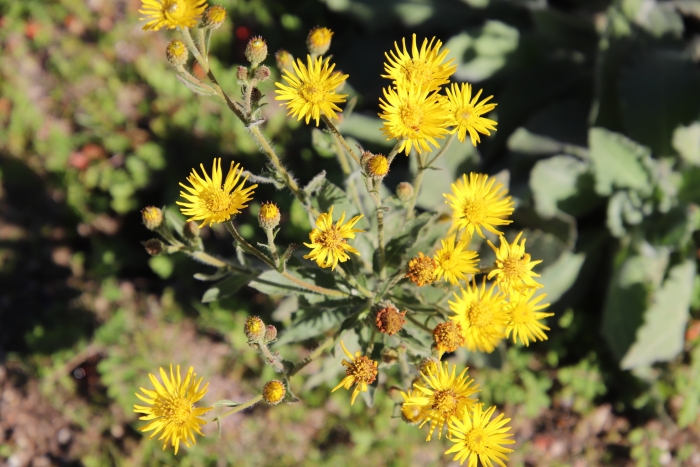Telegraphweed
(Heterotheca grandiflora)
Telegraphweed (Heterotheca grandiflora)
/
/

Millie Basden
CC BY 4.0
Image By:
Millie Basden
Recorded By:
Copyright:
CC BY 4.0
Copyright Notice:
Photo by: Millie Basden | License Type: CC BY 4.0 | License URL: http://creativecommons.org/licenses/by/4.0/ | Rights Holder: Millie Basden | Publisher: iNaturalist | Date Created: 2019-01-09T13:03:46-08:00 |




























































Estimated Native Range
Summary
Heterotheca grandiflora, commonly known as Telegraphweed, is a herbaceous plant that can be an annual, biennial, or perennial, depending on environmental conditions. It is native to the chaparral and coastal sage scrub of the Southwestern United States, and particularly in California. This plant typically grows to exceed one meter (40 inches) in height and is characterized by its tall, bristly, and glandular stature. The leaves are hairy to spiny toothed or lobed, becoming smaller and more widely spaced toward the top of the stem. The inflorescence consists of bright yellow daisy-like flower heads that are particularly showy, blooming from late summer into fall. After flowering, the disc and ray florets drop away, leaving a spherical head of achenes, each with a long white pappus, which aids in wind dispersal.
Telegraphweed is appreciated for its bright yellow flowers and ability to thrive in dry, challenging conditions, making it suitable for xeriscaping and naturalistic plantings. It is often used in restoration projects within its native range due to its adaptability and low water requirements. In cultivation, it prefers full sun to part shade and well-drained soils. While it is drought-tolerant, occasional watering can promote more robust growth. Gardeners should be aware that Heterotheca grandiflora can self-seed and become aggressive in some settings, potentially leading to invasiveness outside its native range. It is advisable to check local regulations before planting to prevent ecological disruptions.CC BY-SA 4.0
Telegraphweed is appreciated for its bright yellow flowers and ability to thrive in dry, challenging conditions, making it suitable for xeriscaping and naturalistic plantings. It is often used in restoration projects within its native range due to its adaptability and low water requirements. In cultivation, it prefers full sun to part shade and well-drained soils. While it is drought-tolerant, occasional watering can promote more robust growth. Gardeners should be aware that Heterotheca grandiflora can self-seed and become aggressive in some settings, potentially leading to invasiveness outside its native range. It is advisable to check local regulations before planting to prevent ecological disruptions.CC BY-SA 4.0
Plant Description
- Plant Type: Herb
- Height: 0.5-2.5 feet
- Width: 1-3 feet
- Growth Rate: Rapid
- Flower Color: Yellow
- Flowering Season: Fall, Spring, Summer, Winter
- Leaf Retention: Deciduous
Growth Requirements
- Sun: Full Sun, Part Shade
- Water: Low
- Drainage: Fast
Common Uses
Bee Garden, Bird Garden, Butterfly Garden, Drought Tolerant, Groundcover, Low Maintenance
Natural Habitat
native to the chaparral and coastal sage scrub of the Southwestern United States, and particularly in California
Other Names
Common Names: Telegraph Plant, Telegraph-Weed, Silk-Grass Golden-Aster, Silk-Grass Goldenaster, Telegraph Weed
Scientific Names: , Heterotheca grandiflora, Heterotheca floribunda,
GBIF Accepted Name: Heterotheca grandiflora Nutt.